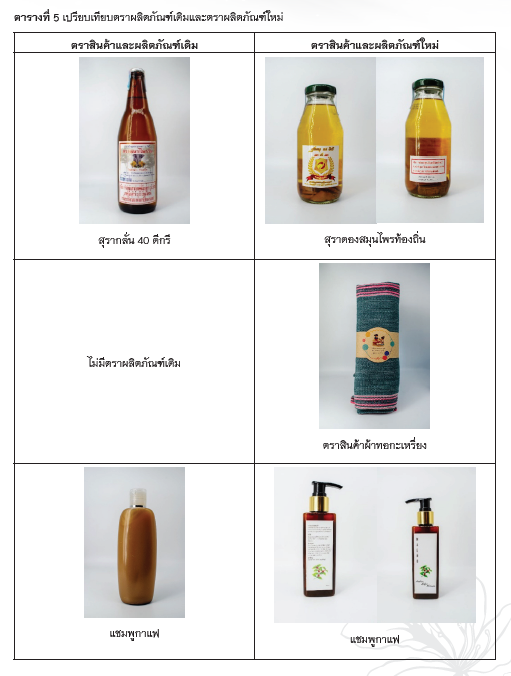The Community Product Development Through the Creative Economy of Smes in Mae Hong Son Province
Main Article Content
Abstract
This research aimed to 1) study the business models and product development needs of small and medium-sized community enterprises (SMEs) in Mae Hong Son Province, and 2) create prototype products for these SMEs using the creative economy. Data was collected from 10 SME entrepreneurs using purposive sampling and in-depth interviews. The data was analyzed and synthesized, narrowing down to 3 entrepreneurs for prototype product development using the creative economy.
The research findings revealed that the entrepreneurs of small and medium-sized community enterprises (SMEs) in Mae Hong Son Province were predominantly women, aged between 35 and 45 years. These businesses were established in various forms, primarily as family-owned SMEs supported by government agencies, and also included community groups managed by school teachers. Both internal and external factors affected business operations. The most emphasized marketing mix factor was the product, including the branding, which needed to reflect the product, create brand recall, add value to the product, and contribute to the creative economy. The second was in importance is marketing promotion, primarily through word-of-mouth, due to its credibility from previous users. The subsequent factors were distribution channels, focusing on consignment sales in local souvenir shops, and pricing strategies based on cost pricing.
Downloads
Article Details

This work is licensed under a Creative Commons Attribution-NonCommercial-NoDerivatives 4.0 International License.
The articles published are copyrighted by the Graduate School, Chiang Mai Rajabhat University.
The opinions expressed in each article of this academic journal are solely those of the individual authors and do not reflect the views of Chiang Mai Rajabhat University or its faculty members. The responsibility for the content of each article rests entirely with the respective authors. In the event of any errors, the authors alone are responsible for their own articles.
References
Chantavanich, S. (2014). Quality research. Bangkok: Chulalongkorn University Press. [In Thai]
Creswell, J. W. (2014). Research design: Qualitative, quantitative, and mixed methods approaches. (4th ed). California: Thousand Oaks.
Chen, Y.-Y.K., Jaw, Y.-L., and Wu, B.-L. (2016). Effect of digital transformation on organizational performance of SMEs. Internet Research, 26(1), 186-212.
Department of Agricultural Extension. (2016). Assessing the potential of community enterprises. Retrieved from https://www.opsmoac.go.th/phichit-dwl-files-442991791932 [In Thai]
Guilford, J.P. (1959) Traits of creativity. In H.H. Anderson, (ed.), Creativity and its cultivation (pp.142-161). New York: Harper & Row.
Hasanat, M. W., Hoque, A., Shikha, F. A., Anwar, M., Hamid, A. B. A., and Tat, H. H. (2020). The impact of coronavirus (Covid-19) one-business in Malaysia. Asian Journal of Multidisciplinary Studies, 3(1), 85–90.
Humphrey, A. (2005) SWOT analysis for management consulting. United States: SRI Alumni Newsletter. SRI International.
Kotler, P. (1997). Marketing management: Analysis, planning, implementation and control. (14th Global ed.). Upper Saddle River, NJ: Prentice-Hall.
Lavong, A., Chatukul, A., Chajchawanpanich, K., Pholkerd, P., and Watcharapongkasem, V. (2021). Product development guideline referring to local identity for competitiveness in Sawai-Chek Community Enterprise, Muang Distirct, Buriram.Interdisciplinary Management Journal Faculty of Management Science, Buriram Rajabhat University, 5(1), 23 – 33. [In Thai]
Office of Small and Medium Enterprise. (2022). Medium enterprise promotion plan and small size edition 4 (2016 - 2020). Retrieved from https://data.go.th/dataset/https-sme-go-th-th-page-php-modulekey-348 [In Thai]
Pongpit, S. (2009). Community enterprise manual. Bangkok: Charoenwittayapim. [In Thai]
Photisita, C. (2019). The art and science of qualitative research. (8th ed). Bangkok: Amarin Printing and Publishing. [In Thai]
Ratchawiang, A. (2017). The future entrepreneur for 4.0. Journal of Humanities and Social Sciences Valaya Alongkorn, 12(2), 79-88. [In Thai]
Social Data-based and Indicator Development Office. (2018). Thailand’s regional revenue and inequality. Bangkok: Office of the National Economic and Social Development Board. [In Thai]
Srisuchart, N. (2018). Suitable innovation development for Thai SMEs business. journal of Humanities and Social Sciences Mahasarakham University, 37(5), 1 – 19. [In Thai]
Satjasomboon, S. and Sukphan J. (2023). The competitive advantages strategies of community-based tourism: Mueang Pon Sub-District, Mae Hong Son Province. Journal of Management Science Research, Surindra Rajabhat University, 7(2), 57-69. [In Thai]
Tanhakorn, T. and Chantuk, T. (2018). Success factors for creative entrepreneurs in the creative economy. Veridian E-Journal, Silpakorn University (Humanities, Social Sciences and arts), 11(1), 396–410. [In Thai]
Teece, D. J. (2010). Business models, business strategy and innovation, Long Range Planning, 43(2-3), 172-194.
Waltz, C.F., Strickland, O. and Lenz, E.R. (2010). Measurement in nursing and health research. New York: Springer Publishing Company.
Wongchaiya, S. and Phuenpha, P. (2018). The influence of Business Strategies and Entrepreneur’s Characteristics that affected to Success of Small and Medium Business. Journal of Researcher Association, 22(2), 139-152. [In Thai]


